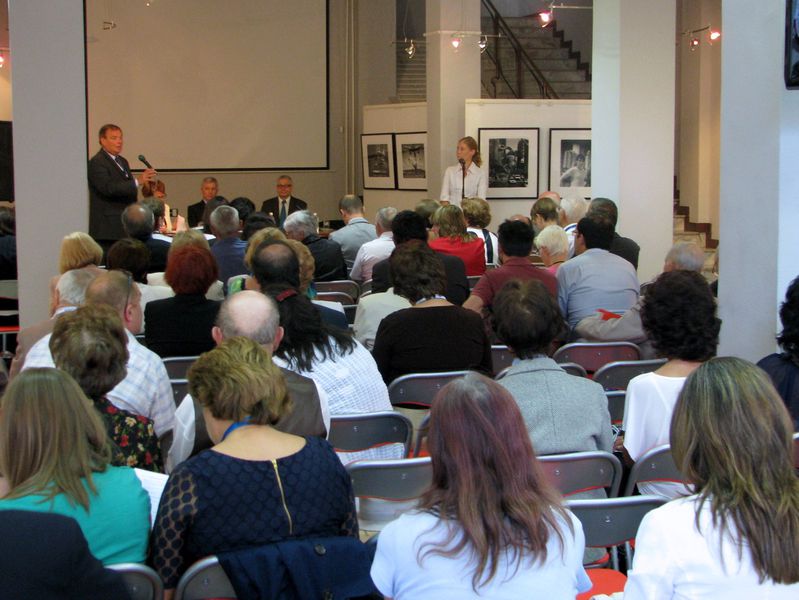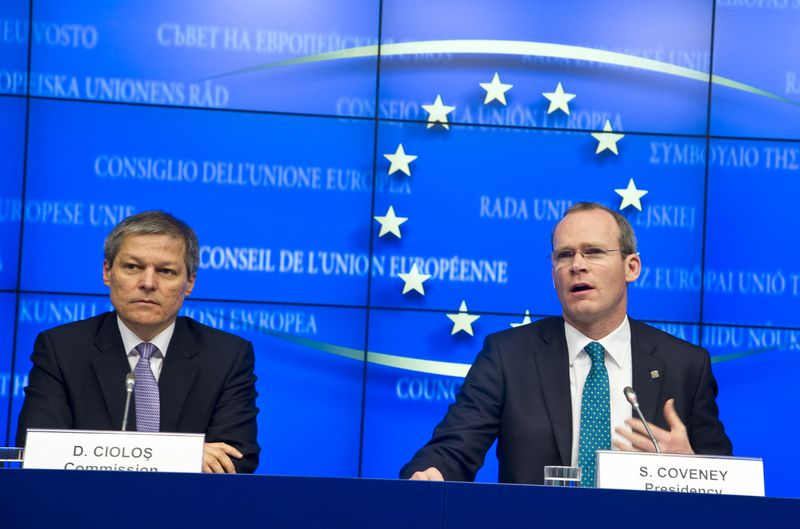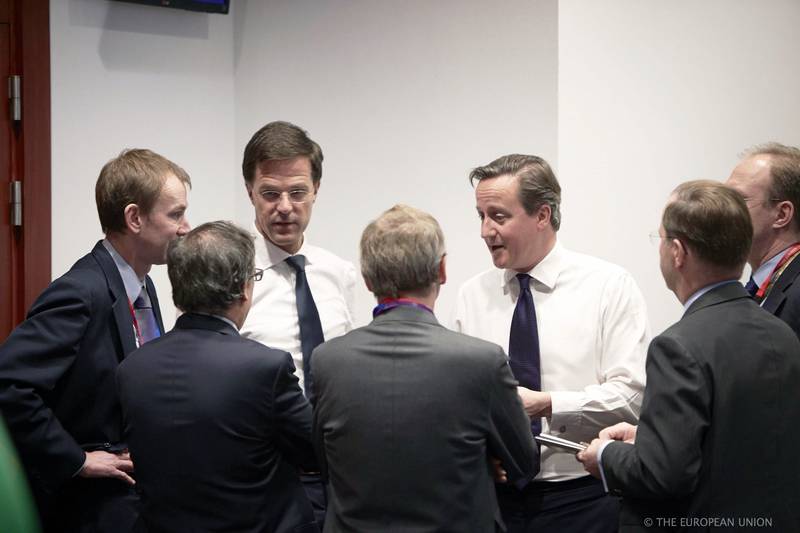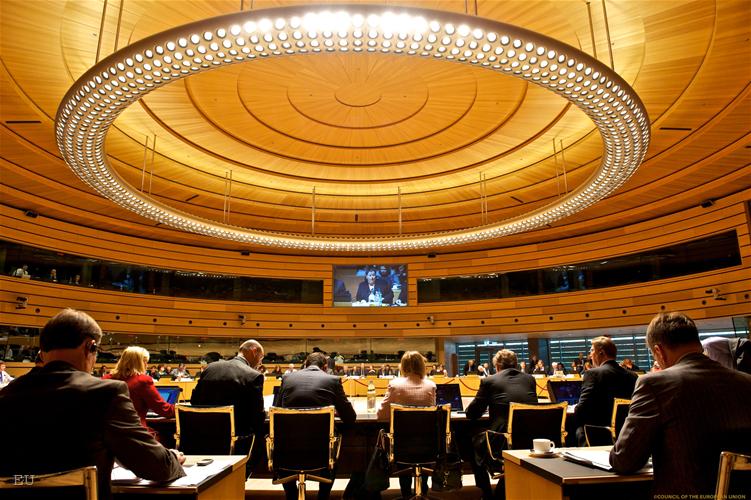The European Agriculture Policy - Now Where to?
Adelina Marini, September 9, 2011
 Some time ago there was this anecdote that if the Asians knew that in Europe we useed the rice to garnish our meat, the world would end up in a serious crisis. As it happens - there are no jokes, everything is true. The question is, however, what will the EU do with the future of its, up to now, most significant and most expensive community policy - the agricultural one? This is a question which the EU is dealing with at various levels for more than a year now. Yet in the beginning of his term EU Agriculture Commissioner Dacian Ciolos, a Romanian, organised a series of public debates, online discussions, conferences and at the end he came up with a communication on the guidelines for the upcoming legislative proposal of the Commission on the reform of the Common Agriculture Policy (CAP).
Some time ago there was this anecdote that if the Asians knew that in Europe we useed the rice to garnish our meat, the world would end up in a serious crisis. As it happens - there are no jokes, everything is true. The question is, however, what will the EU do with the future of its, up to now, most significant and most expensive community policy - the agricultural one? This is a question which the EU is dealing with at various levels for more than a year now. Yet in the beginning of his term EU Agriculture Commissioner Dacian Ciolos, a Romanian, organised a series of public debates, online discussions, conferences and at the end he came up with a communication on the guidelines for the upcoming legislative proposal of the Commission on the reform of the Common Agriculture Policy (CAP).
The culmination of this entire process was the extended debate that took place before the summer vacation of the European Parliament in the Agriculture Committee with the participation of representatives of national parliaments. The good news is that there was a Bulgarian representative and a clearly expressed Bulgarian position. The bad news does not concern the Bulgarian readers only - the debate circled round the size of the CAP budget, the direct payments and the regular dispute between the new and old member states about the historic injustice when defining the size of the subsidies for the new and old member states, as well as on applying green measures in agriculture.
size of the subsidies for the new and old member states, as well as on applying green measures in agriculture.
The facts that have made an anecdote a reality
CAP rapporteur in the Committee Albert Dess (one of the many, by the way, on the issue) presented shocking data about the development of agriculture globally. Quoting data of the Food and Agriculture Organisation (FAO), he said that by 2050 agriculture production should increase by 50% globally. This should happen because of the forecasts that by 2050 Earth's population will reach 9bn people.
In the recent past there was no significant increase of agriculture produce in the EU, quite on the contrary in other parts of the world. For a period of 32 years the production of cereals has increased by 1% globally, but only in Asia it rose by entire 97 per cent. With the meat production, though, the difference is more than conspicuous - in the EU meat production increased by only 6%, while in Asia by 385% (that is coorect - a 3-number figure - three hundred eighty five per cent).
 Against this backdrop, very logical is the question how should European agriculture develop. Should it go in the direction of satisfying the needs of European consumers and taxpayers - a thesis that has a serious number of supporters Europe-wide? The other thesis however, is the EU to pass on boosting more technologically oriented sectors of the economy and after the conclusion of the Doha negotiations for liberalisation of trade barriers in the world, to pass on importing agricultural produce from third countries.
Against this backdrop, very logical is the question how should European agriculture develop. Should it go in the direction of satisfying the needs of European consumers and taxpayers - a thesis that has a serious number of supporters Europe-wide? The other thesis however, is the EU to pass on boosting more technologically oriented sectors of the economy and after the conclusion of the Doha negotiations for liberalisation of trade barriers in the world, to pass on importing agricultural produce from third countries.
The situation with the famine on the African horn though, caused by continuous drought, shows that the EU gains a lot from exports of agricultural production and most of all of food processing.
Who wants what?
Very interesting was the statement of a representative of the Greek parliament. According to her, CAP funding will depend a lot on the new governance of the EU and its institutional model (the economic governance and the institutional changes related to it). She expressed hope that a new system of funding would be found and proposed the introduction of a financial transactions tax (FTT). The idea is envisaged as a source of own revenues for the European budget in the European Commission proposal for the next multiannual financial framework (MFF) for the period 2014-2020. The Greek MP added that it was necessary to introduce tax relieves for farmers because of the high prices of fuels.
One of the most specific demands was presented by the Czech Senate. The Czech position is the CAP budget to be kept as a size and the distribution of money between the first and second pillars to be 80%, accordingly, and 20% (the first pillar is the direct payments and the second - the rural development). Separately, the Czechs propose 80% of the funds to be spent on financing active farming and 20 per cent to be dedicated to green measures under the first pillar.
The other specific position was expressed by Luxembourg's parliament. It says  that putting 30% of the funding on condition for applying green measures is too much. Even now in Luxembourg a lot of green measures are being applied in agriculture as part of the second pillar and almost all farmers participate in those schemes. With the new proposal, however, the farmers will get 30% less subsidies because it is envisaged this "green" boosting to be transferred in the first pillar. "We should not punish the farmers", was the position of the Chambers of Deputies of Luxembourg.
that putting 30% of the funding on condition for applying green measures is too much. Even now in Luxembourg a lot of green measures are being applied in agriculture as part of the second pillar and almost all farmers participate in those schemes. With the new proposal, however, the farmers will get 30% less subsidies because it is envisaged this "green" boosting to be transferred in the first pillar. "We should not punish the farmers", was the position of the Chambers of Deputies of Luxembourg.
These were the most concrete positions, stated during the inter-parliamentary debate. The other statements we can basically divide into two groups: for and against green measures, and equalising the subsidies between the new and old member states of the EU. In this spirit was the position, stated by Christina Ivanova from the Agriculture Committee in the Bulgarian National Assembly. "We think that the payments for Bulgaria should reach their full size in 2014 instead of 2016 as is stipulated in the accession treaty. This will not aggravate seriously EU's budget but would be a significant sign for the Bulgarian farmers that they are equally footed and are equal on the single European market", Mrs Ivanova said and added that the additional assistance for green measures in the first pillar should not duplicate eco measures on the second pillar - a position that practically coincides with that of Luxembourg.
Regarding the small farms, of which there was a word during the three-hour-long debate, Christina Ivanova said that Bulgaria supported the creation of a special scheme to support small farms that could be applied in the form of single fixated payments from a joint fund that is outside the financial packages of the member states.
Malta's Representative also agreed that special attention should be paid to small farmers, who are a majority in the tiny island country. The main challenge for the small farmers is that they just don't know what opportunities they have but even if they knew they lack the resources to use them. This is why bureaucracy must be reduced. Furthermore, in Malta, aside from being small, the farms are exposed to huge competition not only in Europe but also with Africa as the country lies precisely in the middle between Europe and Africa in the Mediterranean.
 In a similar spirit spoke a representative of the Austrian national parliament saying that agriculture should become more regional and therefore more European. A major focus for Austria, however, another Austrian MP said, must be not to allow genetically modified organisms in the European agriculture. "We cannot have 'greening' and in the same time GMO agriculture. GMO have no future and this is something we should state clearly", the Austrian MP said. According to him, the introduction of a FTT was a good source of own revenues.
In a similar spirit spoke a representative of the Austrian national parliament saying that agriculture should become more regional and therefore more European. A major focus for Austria, however, another Austrian MP said, must be not to allow genetically modified organisms in the European agriculture. "We cannot have 'greening' and in the same time GMO agriculture. GMO have no future and this is something we should state clearly", the Austrian MP said. According to him, the introduction of a FTT was a good source of own revenues.
Estonia was among the countries that spoke primarily about the levelling of direct payments between the new and old member states. The envisaged transition period in the new MFF was not good for Estonia. Poland, which currently is holding the EU Presidency, also shares the opinion that the transition period for levelling of direct payments is not appropriate. The Polish MP however, said that direct payments in fact were a worrying phenomenon which needed to be counteracted. "We have to ensure that an attempt will be made to level the payments in the entire EU. The transition period is not certain and could be a threat to the single market".  Regarding green measures, the Polish Senate thinks that they should not lead to additional burden for the small farms.
Regarding green measures, the Polish Senate thinks that they should not lead to additional burden for the small farms.
Enough agriculture subsidies!
And whereas between some players in the EU there are negotiations taking place about the size of the CAP, about levelling of direct payments and boosting environment protection, professor Ulrich Koester from the University of Kiel shattered the main arguments.
"If, despite these many criticisms, the system of direct payments is maintained, then any talk of levelling these across member states should be strongly opposed. Currently, there are significant differences in the level of payments per hectare between the individual Federal states in Germany and between the old (EU-15) and new (EU-12). [...] First, the origin of the payments and their size in the EU-15 still reflects the earlier reduction in intervention prices for agricultural products. In the EU-12, however, following their accession they have experienced almost without exception politically-dictated price increases. Compensation in these circumstances is hardly justified", professor Ulrich Koester wrote for the German periodic Wirtschaftsdienst and was quoted by the specialised web site for the CAP reform.
 Furthermore, he says, no one proposes because for the sake of the principle of competitiveness government officials in all member states of the EU to get the same salaries. "Why, then, should it be necessary to equalise the income to land?", professors Koester asked. He heavily criticises the second pillar of the CAP, which is based on the European Agricultural Fund for Rural Development. "Because agriculture, even in those countries such as Romania and Bulgaria which are the least developed Member States, cannot be the main driver of rural development, much of these funds in the second pillar are ineffective in promoting rural development and often spent inefficiently". The professor quotes the European Court of Auditors report, in which it is pointed out that efficiency of these measures, applied currently in this pillar, could not be measured.
Furthermore, he says, no one proposes because for the sake of the principle of competitiveness government officials in all member states of the EU to get the same salaries. "Why, then, should it be necessary to equalise the income to land?", professors Koester asked. He heavily criticises the second pillar of the CAP, which is based on the European Agricultural Fund for Rural Development. "Because agriculture, even in those countries such as Romania and Bulgaria which are the least developed Member States, cannot be the main driver of rural development, much of these funds in the second pillar are ineffective in promoting rural development and often spent inefficiently". The professor quotes the European Court of Auditors report, in which it is pointed out that efficiency of these measures, applied currently in this pillar, could not be measured.
The debates on the new MFF are yet to become even more heated as in end-October the Polish Presidency is organising a huge conference on the issue with national parliaments also taking part. CAP, as its budgetary share shows, will be one of the major issues to be debated. euinside will follow closely the MFF debates, as well as the Commission's legislative ideas on CAP for the next programming period. What has been achieved so far you can see in our special subjects about the MFF and the CAP. You can also follow euinside in Twitter and Facebook.
 | © Polish Embassy in Sofia
| © Polish Embassy in Sofia | © Council of the EU
| © Council of the EU Kristalina Georgieva | © Council of the EU
Kristalina Georgieva | © Council of the EU Mark Rutte, David Cameron | © Council of the EU
Mark Rutte, David Cameron | © Council of the EU | © European Parliament
| © European Parliament | © EU
| © EU